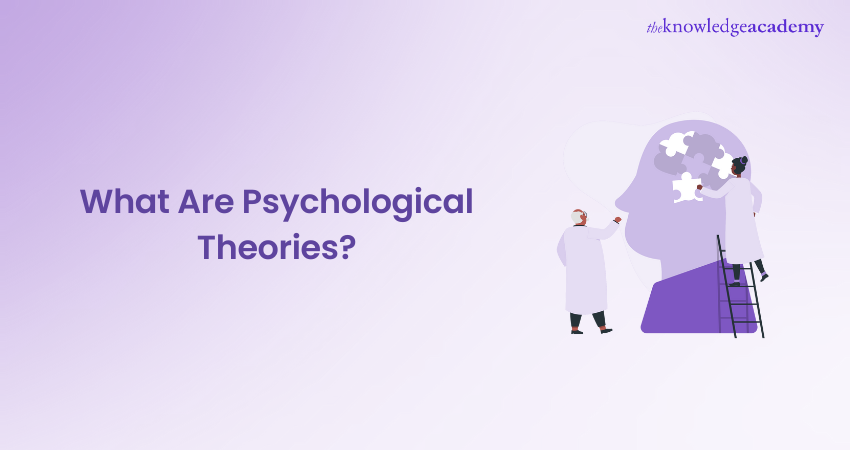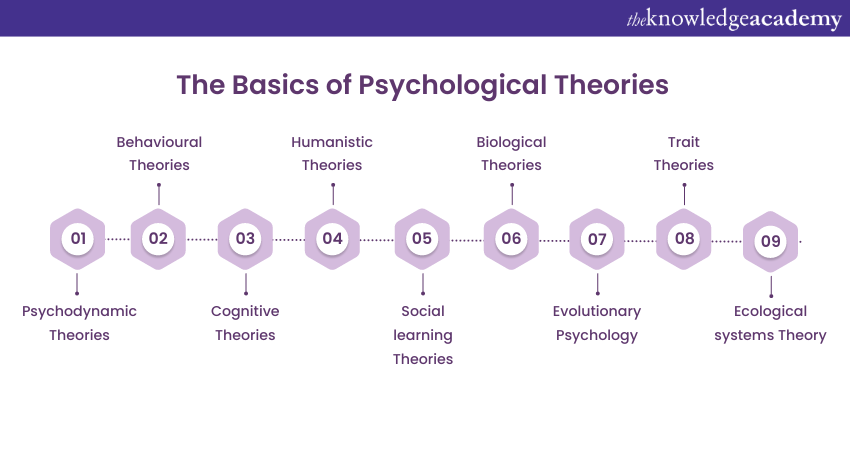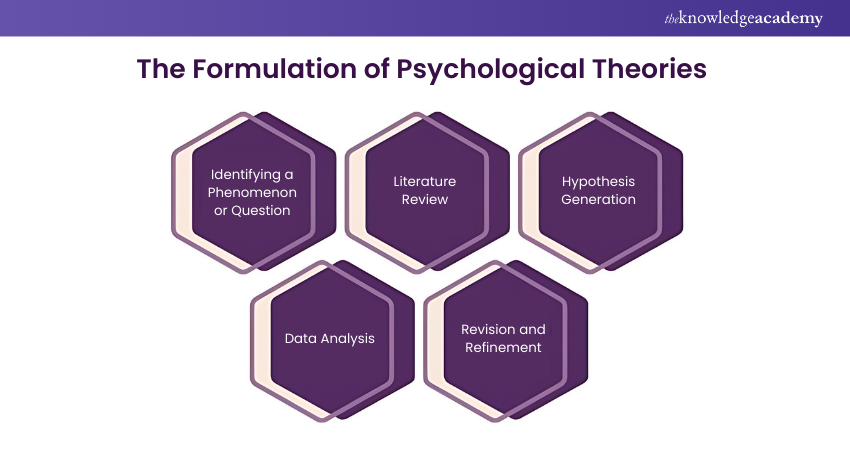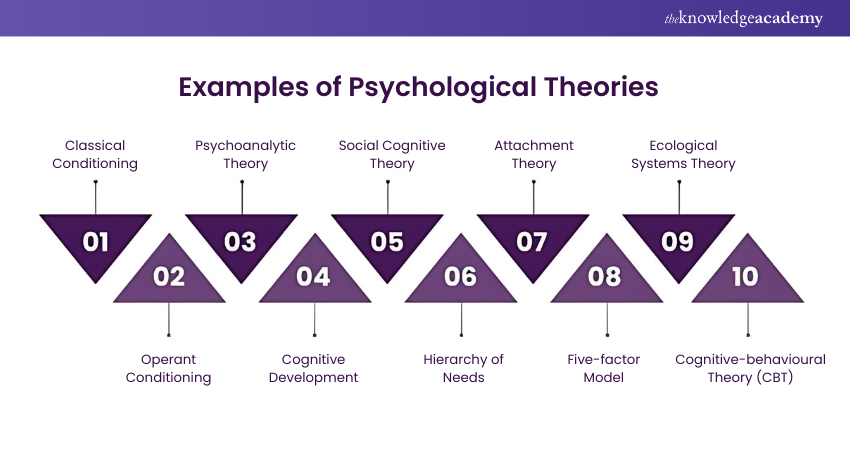We may not have the course you’re looking for. If you enquire or give us a call on +39 800580270 and speak to our training experts, we may still be able to help with your training requirements.
Training Outcomes Within Your Budget!
We ensure quality, budget-alignment, and timely delivery by our expert instructors.

Psychological Theories are like the blueprints of the human mind, crafted by brilliant Psychologists and Researchers to decode the mysteries of our thoughts, feelings, and actions. These theories don’t just sit in textbooks; they actively shape our understanding of ourselves and the world around us.
Imagine having a roadmap that explains why you feel anxious before a big presentation or why certain memories make you smile. That’s the power of Psychological Theories! They pave the way for groundbreaking therapies, innovative teaching methods, and a deeper connection with our own minds.
Curious about how these theories have evolved and their real-world impact? Dive into this blog to uncover the fascinating world of Psychological Theories, their significance, diverse forms, and practical examples. Learn how you can apply these insights to enhance your everyday life and gain a profound understanding of what makes you tick.
Table of Contents
1) The Basics of Psychological Theories
2) Major Categories of Psychological Theories
3) The Formulation of Psychological Theories
4) Examples of Psychological Theories
5) The Evolution of Psychological Theories
6) Conclusion
The Basics of Psychological Theories
Psychological Theories provide frameworks for understanding and explaining human behaviour, thoughts, emotions, and actions. They help Psychologists and researchers make sense of the complex workings of the mind.

1) Psychodynamic Theories: Psychodynamic Theories, often associated with Sigmund Freud, focus on the role of unconscious thoughts and desires in shaping behaviour. These theories suggest that early childhood experiences have a significant influence on later development and behaviour. One well-known concept is Freud's model of the mind, which consists of the conscious, unconscious, and preconscious levels.
2) Behavioural Theories: Behavioural Theories focus on observable behaviours and their relationship with environmental stimuli. For example, B.F Skinner's operant conditioning theory suggests that behaviours are learned through reinforcement and punishment. These theories are essential in understanding how external factors shape actions.
3) Cognitive Theories: Cognitive Theories explore mental processes such as thinking, memory, perception, and problem-solving. Jean Piaget's cognitive development theory describes how children's thinking evolves as they interact with their environment. Cognitive approaches shed light on how individuals process information and make decisions.
4) Humanistic Theories: Humanistic Theories, like those proposed by Abraham Maslow and Carl Rogers, focus on individual growth, self-actualisation, and personal experiences. These theories focus on the importance of meeting psychological needs and realising one's potential for psychological well-being.
5) Social Learning Theories: Social Learning Theories, championed by Albert Bandura, highlight the role of observational learning and modelling in shaping behaviour. Bandura's Bobo doll experiment demonstrated how children imitate behaviours they observe in others, illustrating the influence of social context on learning.
6) Biological Theories: Biological Theories examine the relationship between physiological processes and behaviour. Neuroscience explains how the brain and nervous system contribute to thoughts, emotions, and actions. The study of genetics and heritability also plays a role in understanding how traits are passed down across generations.
7) Evolutionary Psychology: Evolutionary Psychology proposes that human behaviour and cognition have evolved to adapt to the challenges of survival and reproduction. This perspective suggests that certain behaviours, emotions, and cognitive processes can be understood as products of natural selection.
8) Trait Theories: Trait Theories focus on identifying and categorising consistent personality traits that influence behaviour. The Five-Factor Model (Openness, Conscientiousness, Extraversion, Agreeableness, Neuroticism) is a widely adopted framework to describe and measure personality traits.
9) Ecological Systems Theory: Proposed by Urie Bronfenbrenner, this theory highlights the interaction between an individual and their environment. It recognises that development is influenced by multiple layers, from immediate family to broader cultural contexts.
Major Categories of Psychological Theories
Psychological Theories are categorised into several major groups or domains. Each of them focuses on specific aspects of human behaviour and mental processes. These categories help organise and classify the diverse theories within the field of psychology. The major categories of Psychological Theories include:
1) Biological Theories: These theories focus on the relationship between the brain, nervous system, and behaviour. They explore how genetics, neurotransmitters, hormones, and brain structures influence psychological processes. Neuroscientific advancements have provided insights into schizophrenia, depression, and anxiety disorders.
2) Cognitive Theories: These theories examine mental processes, including perception, memory, reasoning, and problem-solving. They explore how people acquire, process, and store information. This understanding leads to insights into cognitive biases, decision-making, and cognitive development across the lifespan.
3) Behavioural Theories: These theories highlight observable behaviours and how they are learned through interactions with the environment. Operant conditioning, classical conditioning, and social learning ideas fall under this category. They're essential in behaviour modification, addiction treatment, and education.
4) Psychodynamic Theories: These theories, rooted in the works of Freud and his followers, highlight the role of unconscious processes in shaping behaviour. Concepts like the id, ego, superego, and defence mechanisms contribute to our understanding of personality, motivation, and psychotherapy.
5) Humanistic Theories: These theories focus on individual growth, self-actualisation, and personal experiences. They stress the importance of free will, self-awareness, and pursuing one's potential. Abraham Maslow's hierarchy of needs and Carl Rogers' client-centred therapy are prominent examples.
6) Social and Cultural Theories: These theories examine how social interactions, institutions, and cultural norms influence behaviour and psychological processes. Social identity theory, cultural Psychology, and theories of prejudice and discrimination fall within this realm.
7) Developmental Theories: These theories explore how individuals change and evolve over their lifetimes. Jean Piaget's cognitive development and Erik Erikson's psychosocial stages are iconic examples. These theories provide insights into how people learn, mature, and adapt from infancy to old age.
8) Evolutionary Psychology: This subject draws from evolutionary biology to understand how psychological traits and behaviours have evolved to enhance survival and reproduction. It explores adaptations, such as aggression, mate selection preferences, and universal human characteristics.
9) Trait Theories: These theories aim to categorise and measure consistent behaviour, emotion, and thought patterns. The Five-Factor Model (Big Five) is a widely accepted framework with dimensions like openness, conscientiousness, extraversion, agreeableness, and neuroticism.
10) Positive Psychology: This subject studies positive emotions, strengths, virtues, and factors that contribute to human flourishing. It aims to enhance well-being, resilience, and the qualities that make life fulfilling.
11) Ecological Systems Theory: Bronfenbrenner views individuals as embedded within various interconnected environments, from family and peers to culture and society. It highlights the dynamic interplay between these systems in shaping development.
12) Attachment Theory: Bowlby examines the bonds formed between caregivers and children. It sheds light on how early relationships influence emotional and social development.
Do you want to learn effective mental health practices for leading a healthier life? Sign up with our Mental Health Course now and take the first step.
The Formulation of Psychological Theories

The formulation of Psychological Theories is a complex and systematic process that involves the development of organised frameworks or models to explain and understand various aspects of human behaviour and mental processes. The creation of Psychological Theories typically follows several key steps:
1) Identifying a Phenomenon or Question: The formulation of a psychological Theory often begins with the identification of a specific psychological phenomenon or a question about human behaviour or mental processes. This phenomenon could be related to anything from memory and learning to social behaviour and emotions.
2) Literature Review: Researchers conduct a detailed review of existing research and literature related to the chosen phenomenon or question. This step helps them understand what is already known and what gaps or unanswered questions exist in the field.
3) Hypothesis Generation: Researchers begin to generate hypotheses, or educated guesses, based on their review of the literature. These hypotheses aim to uncover the underlying causes, mechanisms, or relationships involved in the phenomenon they are investigating. They serve as the foundation for the theory.
4) Conceptualisation: Researchers develop a conceptual framework or model that outlines the key concepts and variables related to the phenomenon. They define these concepts and their relationships, creating a structured overview of the Theory.
5) Operationalisation: This step involves defining how the key concepts will be measured or observed in empirical research. Operationalisation is essential for designing experiments or studies that test the Theory's hypotheses.
6) Testing and Empirical Research: Psychological Theories must be tested through empirical research. Researchers design experiments, observational studies, surveys, or other research methods to gather data that can either support or challenge the Theory. The data collected help researchers evaluate the validity and applicability of the Theory.
7) Data Analysis: After collecting data, researchers analyse it to determine whether the results align with the theory's predictions and hypotheses. Various statistical and analytical methods are employed to draw meaningful conclusions.
8) Refinement and Revision: If the empirical research reveals that the theory needs adjustments or improvements, researchers refine or revise the Theory accordingly. This process may involve modifying the theory's concepts, relationships, or assumptions based on the new evidence.
9) Peer Review and Validation: Psychological Theories are subject to peer review by experts in the field. Other researchers assess the Theory's rigour, methodology, and findings to ensure its validity and reliability. Validation from the scientific community is important for the Theory's acceptance and credibility.
10) Publication and Dissemination: If a theory withstands empirical testing and peer review, it is typically published in academic journals or books. This makes it accessible to the wider scientific community. Dissemination allows other researchers to build upon the theory and conduct further research.
11) Application and Practical use: Once a psychological Theory is established and validated, it can have practical applications. It may inform therapeutic interventions, educational strategies, policy development, or other real-world practices.
12) Integration and Synthesis: Over time, Psychological Theories contribute to the broader body of knowledge in psychology. Researchers may integrate and synthesise multiple Theories to form a more comprehensive understanding of complex psychological phenomena.
It's important to note that the formulation of Psychological Theories is an iterative process. Theories may be refined, expanded, or even replaced as new evidence and insights emerge. This process of ongoing investigation and theory development is important for the advancement of the field of psychology and our understanding of human behaviour and mental processes.
Gain knowledge to recognise the early signs and risks of mental illness with our Child Psychology Courses.
Examples of Psychological Theories
Each theory offers a unique perspective, contributing to a comprehensive understanding of the complexities of the human mind. Below are some of the most influential Psychological Theories that have shaped the field of psychology and continue to inform research and practice:
1) Classical Conditioning: Classical conditioning, formulated by Ivan Pavlov, is a fundamental behaviourist theory. It explains how associations between stimuli can lead to learned responses.
Pavlov's famous experiments with dogs demonstrated that a neutral stimulus, like a bell, paired with a naturally occurring stimulus, like food. This pairing could eventually elicit a conditioned response, such as salivation, even in the absence of the natural impulse. This theory has widespread applications, from understanding phobias to marketing strategies.

2) Operant Conditioning: B.F. Skinner's operant conditioning Theory focuses on how consequences shape behaviour. It posits that behaviours followed by rewards (reinforcement) are more likely to be repeated. Meanwhile, behaviours followed by punishments are less likely to be repeated. This theory helps us understand how behaviours are acquired and modified, influencing fields like education and behaviour therapy.
3) Psychoanalytic Theory: Sigmund Freud's psychoanalytic theory explains the unconscious mind's influence on behaviour. It suggests unconscious desires, conflicts, and motivations drive behaviour and psychological experiences. Concepts like the id, ego, superego, and defence mechanisms explain personality development and intrapsychic dynamics.
4) Cognitive Development: Jean Piaget's cognitive development theory focuses on how children's thinking evolves as they interact with their environment. He proposed four stages of cognitive development, which describe how children acquire cognitive skills, problem-solving abilities, and the capacity to think abstractly.
5) Social Cognitive Theory: Bandura's social cognitive theory stresses the role of observation and modelling in learning. It suggests that individuals learn by observing others' behaviours, outcomes, and consequences. Bandura's Bobo doll experiments highlighted how children imitate aggressive behaviours they witness, underscoring the impact of social context on learning.
6) Hierarchy of Needs: Abraham Maslow's needs hierarchy theory outlines a pyramid of human needs, ranging from physiological conditions to self-actualisation. This theory posits that people strive to meet basic needs before pursuing higher-level goals, which has implications for motivation, personal growth, and well-being.
7) Attachment Theory: Attachment Theory, constructed by John Bowlby, explores the emotional bonds formed between infants and their caregivers. It suggests that these early attachments influence later emotional and social development. Secure attachments lead to healthy relationships, while insecure attachments may result in difficulties with trust and intimacy.
8) Five-factor Model: The Five Factor Model is a prominent trait theory of personality that identifies five broad dimensions. These dimensions are Openness to Experience, Conscientiousness, Extraversion, Agreeableness, and Neuroticism. These traits provide a framework for describing individual differences in personality and behaviour across various contexts.
9) Ecological Systems Theory: Urie Bronfenbrenner's ecological systems Theory emphasises the interconnectedness between individuals and their environment. It identifies multiple systems influencing development and behaviour, from immediate family to broader cultural and societal contexts.
10) Cognitive-behavioural Theory (CBT): Cognitive-behavioural theory integrates cognitive processes and behavioural principles. It suggests that thoughts, emotions, and behaviours are interconnected. CBT identifies and modifies negative thought patterns to promote healthier feelings and behaviours. It is widely used in psychotherapy.
Learn various exercises and techniques for increasing mental strength with our Handle Stress and Develop Your Resilience course – Join today!
The Evolution of Psychological Theories
The evolution of Psychological Theories has been a dynamic and ongoing process over the past centuries. As our understanding of the human mind and behaviour has deepened, Psychological Theories have evolved and adapted to include new findings, perspectives, and paradigms. Here's a brief overview of the key stages in the evolution of Psychological Theories:
1) Early Philosophical Roots (Ancient Greece to 17th Century)
The earliest psychological inquiries were philosophical in nature. Ancient Greek philosophers like Plato and Aristotle explored topics related to the mind, consciousness, and the nature of the self.
Descartes' dualism, which separated the mind (the thinking self) from the body (the physical self), laid the groundwork for discussions of the mind-body relationship.
2) Emergence of Empirical Research (18th Century)
The Enlightenment period brought about a focus on empiricism and observation. Philosophers like John Locke highlighted the importance of sensory experience and observation as sources of knowledge.
3) Structuralism and Functionalism (Late 19th Century)
Wilhelm Wundt is often credited with establishing the first psychology laboratory in 1879, marking the formal beginning of psychology as a scientific discipline. Edward Titchener's structuralism aimed to analyse the structure of consciousness, focusing on identifying and describing basic elements of thought. William James' functionalism highlighted the study of mental processes in terms of their adaptive functions and contributions to survival.
4) Psychoanalysis and Psychodynamic Theories (Late 19th to Early 20th Century)
Sigmund Freud's psychoanalytic theory introduced the idea that unconscious processes significantly influence human behaviour. This theory revolutionised thinking about the mind but was later critiqued and modified.
5) Behaviourism (Early to Mid-20th Century)
Behaviourism, founded by John B. Watson and developed by B.F. Skinner dominated psychology during the early and mid-20th century. Behaviourism focuses on observable behaviour and the role of reinforcement and conditioning in shaping human conduct.
6) Cognitive Revolution (1950s to 1960s)
The cognitive revolution shifted the focus of psychology back to the study of mental processes. Researchers like George Miller and Ulric Neisser emphasised topics such as memory, perception, problem-solving, and language.
7) Humanistic Psychology (1950s to 1960s)
Humanistic psychology, led by Abraham Maslow and Carl Rogers, emphasises human potential, self-actualisation, and personal growth. This approach contrasts with the more behaviourally focused paradigms of the time.
8) Social and Cultural Psychology (20th Century)
The 20th century saw the development of social and cultural psychology. These fields explored how social interactions, group dynamics, and cultural factors influence human behaviour and identity.
9) Biological and Evolutionary Psychology (Late 20th Century to Present)
The late 20th century saw a surge in research into the biological basis of behaviour including, genetics, brain structure, and neurochemistry. Evolutionary psychology examines how human behaviour and cognition may be shaped by evolutionary processes.
10) Cognitive Behavioural Approaches (Late 20th Century to Present)
Cognitive-behavioural Theories (CBT), which integrate cognitive and behavioural perspectives have became prominent in psychology. They emphasise the role of thoughts, beliefs, and conditioning in shaping behaviour and emotions.
11) Contemporary Psychological Theories (Present)
Today, psychological theories continue to evolve, incorporating findings from neuroscience, technology, and cross-disciplinary research. These theories address various topics, including mental health, social behaviour, cognition, and motivation.
Conclusion
Psychological Theories offer valuable insights into the complex workings of the human mind and behaviour. They provide structured frameworks to understand human thoughts, feelings, and actions, guiding research and practice in fields like therapy and education. As these theories evolve, they enhance our understanding of human psychology and drive innovation in mental health and well-being.
Understand the strategies for cultivating happiness and resilience with our Positive Psychology Course – Register now!
Frequently Asked Questions

To explain a theory, introduce its key concepts, purpose, and significance. Discuss its origins, foundational principles, and real-world applications. Use examples to illustrate how it operates and highlight its impact on understanding specific phenomena or solving problems.

To analyse a Psychology Theory, first understand its core concepts and assumptions. Evaluate its evidence and methodology, considering empirical support and limitations. Compare it with other theories, and assess its applicability in real-world contexts, considering its contributions and shortcomings.

The Knowledge Academy takes global learning to new heights, offering over 30,000 online courses across 490+ locations in 220 countries. This expansive reach ensures accessibility and convenience for learners worldwide.
Alongside our diverse Online Course Catalogue, encompassing 17 major categories, we go the extra mile by providing a plethora of free educational Online Resources like News updates, Blogs, videos, webinars, and interview questions. Tailoring learning experiences further, professionals can maximise value with customisable Course Bundles of TKA.

The Knowledge Academy’s Knowledge Pass, a prepaid voucher, adds another layer of flexibility, allowing course bookings over a 12-month period. Join us on a journey where education knows no bounds.

The Knowledge Academy offers various Mental Health Courses, including Psychology Course, Mental Capacity Training, and Positive Psychology Course. These courses cater to different skill levels, providing comprehensive insights into Emotional Wellbeing.
Our Health & Safety Blogs cover a range of topics related to Mental Health, offering valuable resources, best practices, and industry insights. Whether you are a beginner or looking to advance your Mental Health knowledge, The Knowledge Academy's diverse courses and informative blogs have you covered.
Upcoming Health & Safety Resources Batches & Dates
Date
 Psychology Course
Psychology Course
Fri 14th Feb 2025
Fri 11th Apr 2025
Fri 13th Jun 2025
Fri 15th Aug 2025
Fri 10th Oct 2025
Fri 12th Dec 2025







 Top Rated Course
Top Rated Course


 If you wish to make any changes to your course, please
If you wish to make any changes to your course, please


